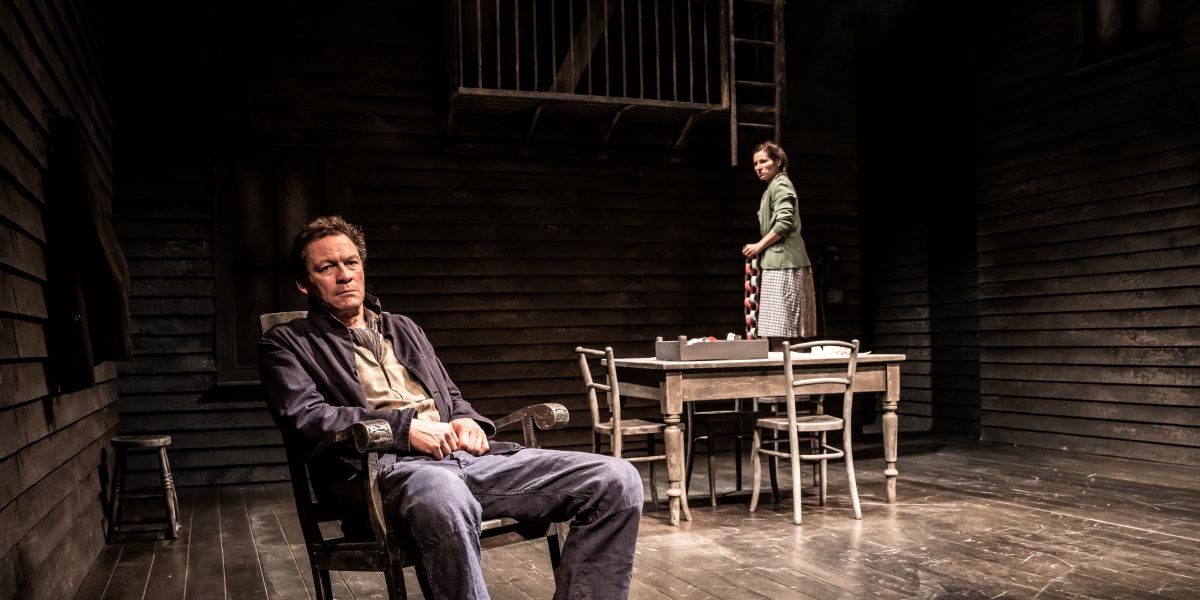‘A View from the Bridge’ comes from Arthur Miller’s golden period in the 1950s, when every play proved to be a palpable and durable hit. For this reviewer, it stands as his masterpiece simply because it most perfectly embodies Miller’s aspiration to explore the big questions of the day, reaching out to cosmically significant human themes, through the particular motor of one family’s story. In other plays the relationship between the energy of the drama and the larger framework can be out of kilter leading to over-freighted dialogue and a tendentious didacticism. But here the balance is absolutely right between the issues and the concentration and pace of the action.
This is Miller’s best version of a staple theme of Greek tragedy – one man’s character and his inevitable destiny. This is the story of Eddie Carbone, longshoreman from Brooklyn, and how he comes eventually to defy the conventions of his Italian-American community. The action is set against the background of migration to escape poverty in Europe and the transfer of the social and religious conventions of Southern Italy into the Redhook area of Long Island. Eddie has worked for many years in the dockyards to achieve a degree of stability for his wan and down-trodden wife Beatrice and has made many sacrifices to bring up his feisty niece, Catherine, now chafing at the boundaries of home, seeking escape whether into work or marriage. Into this family enter Marco and Rodolpho, brothers and relatives of Beatrice, fresh off the boat as illegal immigrants, and both dependents and potential disruptors of Eddie’s little patriarchal world. The action that plays out is framed and interpreted by a narrator figure, a lawyer who advises, encourages and warns both Eddie and the audience.
The interpenetration of the family and the wider community is well demonstrated in the set by Peter McKintosh. There are no boundaries between street and living space and the high enclosed spaces speak of tenement isolation and confinement. A lonely jazz trumpet introduces the action as a scene in urban alienation. This is a world of hard-scrabble poverty, punishing work, social taboos, and pleasures snatched as best they can be.
At the centre of the action is the flawed patriarchal figure of Eddie, a study in male fragility, demanding respect even as his actions gradually serve to diminish him. Dominic West offers a memorable portrayal, capturing not just the anguish and the unpleasantness, but also his many positive qualities. For this play to work as a tragedy we have to see how Eddie is in some ways an impressive figure, not as a stage villain, and that he has a genial and benevolent side. Director Lindsay Posner and West himself clearly grasp this aspect, and the evening is all the stronger for it.
The production is just as strong in its ensemble as it is in the lead role. Nia Towle finds both sweetness and steel in the part of Catherine. Again, you have to believe in the previous strength of her connection to Eddie, as a protective father figure. Once that is in place the painful nature of her dilemma becomes all the more powerful, once she appreciates how unhealthy that relationship has now become. She also calibrates finely the way in which her sexual and emotional awakening takes place through her new connection with Rodolpho, the young, charismatic migrant. This latter role is difficult to bring off. It is greatly to the credit of Callum Scott Howells that he manages to create a coherent character out of what can be, in a poor production, just a set of startling attributes. He conveys Rodolpho’s gentleness of spirit, and therefore the core of his appeal to Catherine, just as well as he does the talented singer, dancer and joker – all the things that Eddie is not and that feed into his jealous rage.
In some ways the revelation among the performances is Kate Fleetwood, as the much-neglected wife, Beatrice. It is a feature of the production that her portrayal is more defiant and less recessed than is usual. She is in many ways the conscience of the play, acting out the regular wifely part in Miller of knowing her husband’s flaws all too well, but desperately trying to keep the show on the road. Thus the conclusion of the play, that the tragedy is as much hers as his, is truly earned. There are also very solid performances from Pierro Niel-Mee, as Marco, the strong and less articulate brother, and Martin Marquez, as the wistful narrator.
All in all, this is an impressive evening’s theatre, and all the better for being fairly traditional in its framing. This play can speak loudly enough for itself, and here it is allowed to do so.
Arthur Miller
Director: Lindsay Posner
Cast: Kate Fleetwood, Martin Marquez, Pierro Niel-Mee, Callum Scott Howells, Nia Towle, Dominic West
Until: 3 August 2024
2 hrs 20 mins with interval

